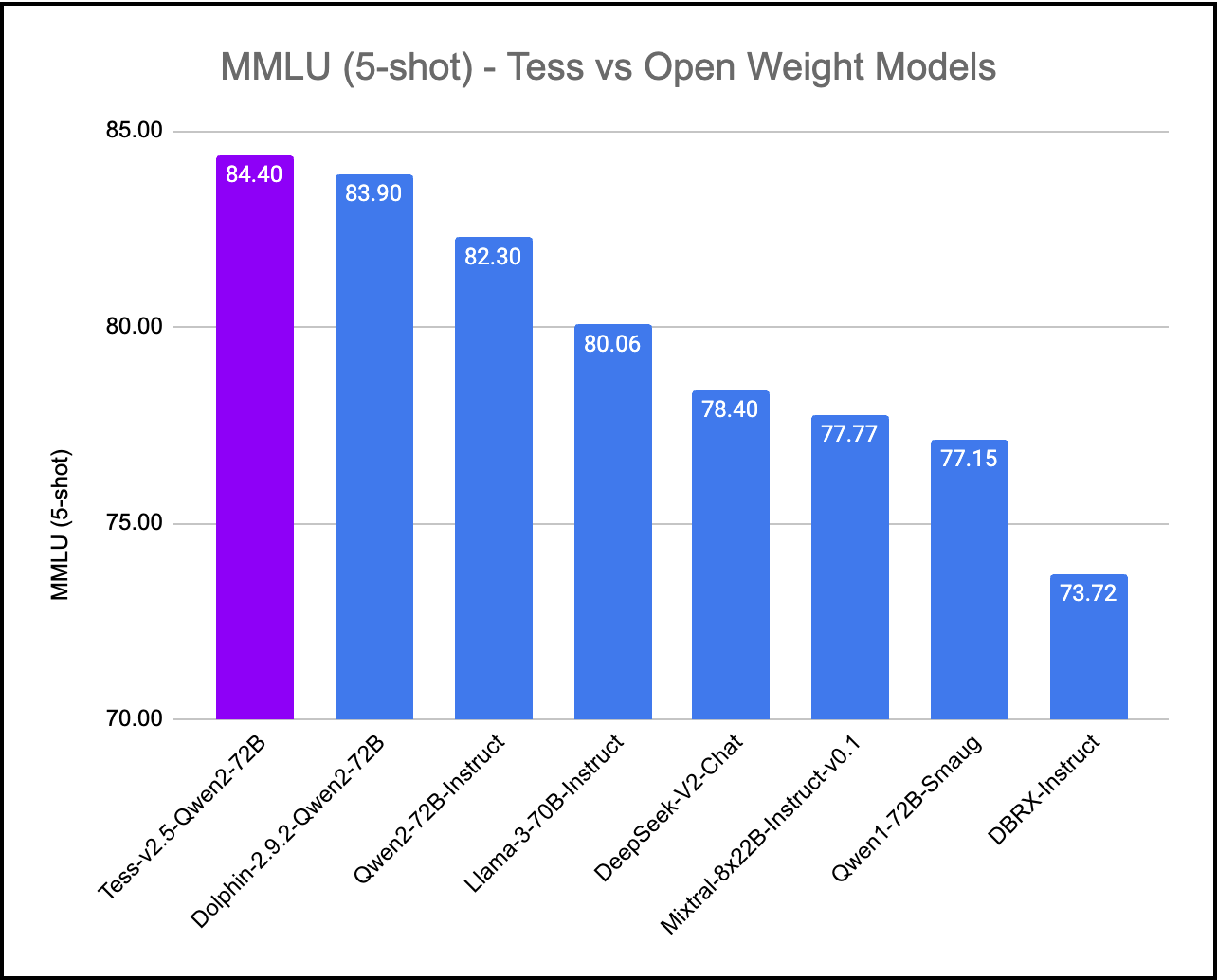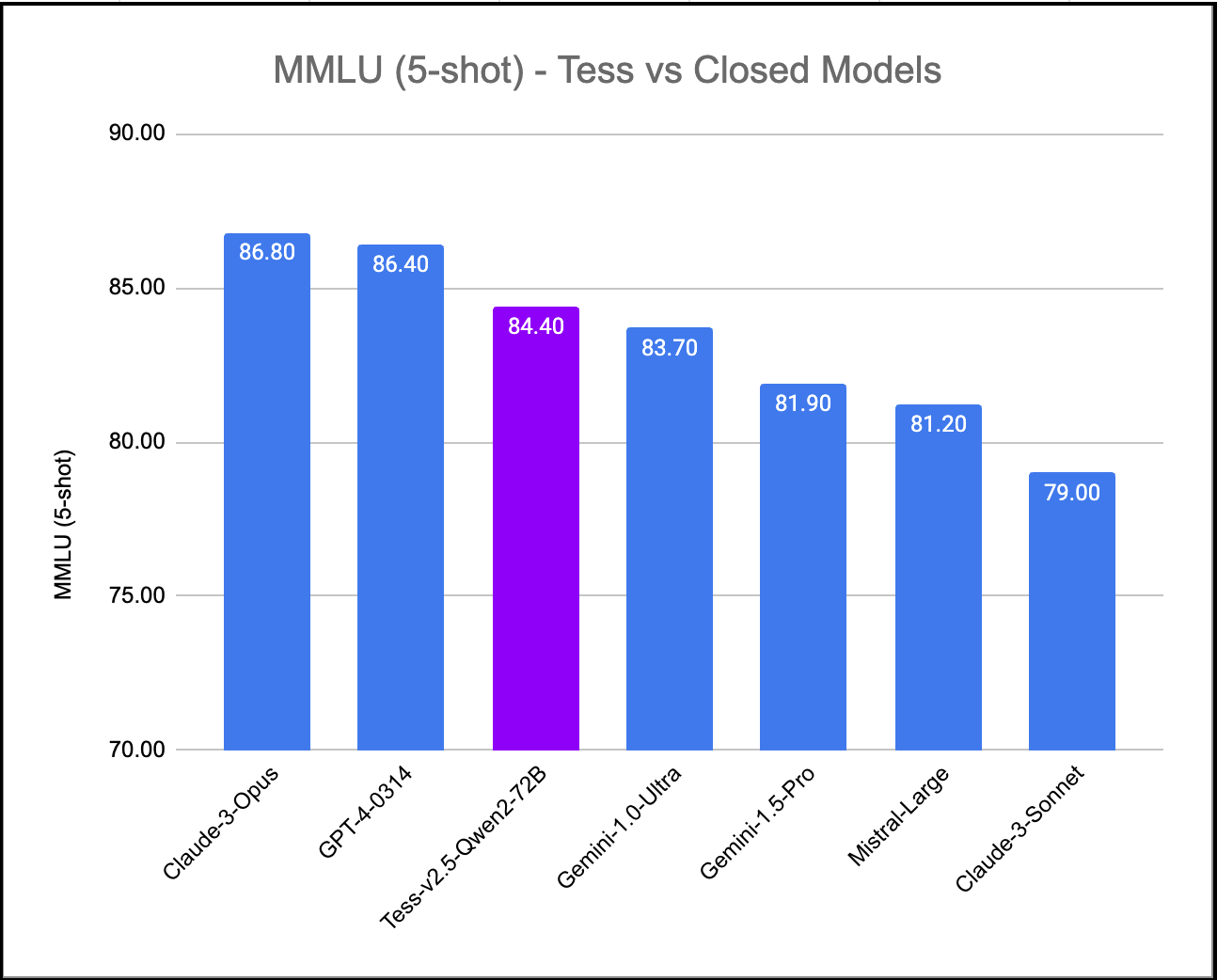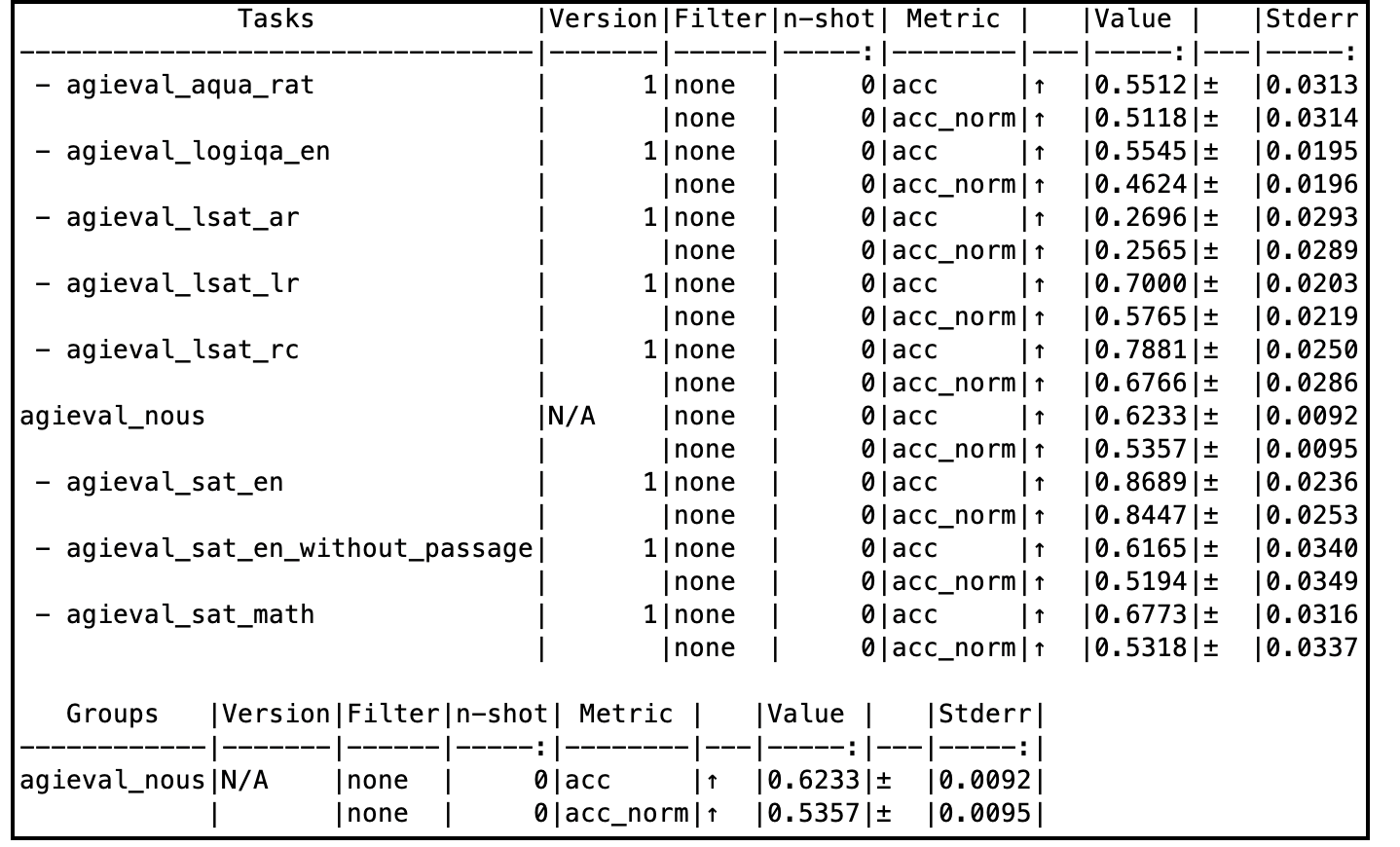201 Downloads Updated 1 year ago
Tess-v2.5 (Qwen2-72B) was fine-tuned over the newly released Qwen2-72B base, using the Tess-v2.5 dataset that contain 300K samples spanning multiple topics.
ollama run vanilj/tess-v2.5-qwen2-72b:Q2_K
Details
Updated 1 year ago
1 year ago
c5efd15d6015 · 30GB ·
Readme
Original model files can be found here.
GGUF files can be found here, Q4_K_M from here.
Tess-v2.5 (Qwen2-72B)

We’ve created Tess-v2.5, the latest state-of-the-art model in the Tess series of Large Language Models (LLMs). Tess, short for Tesoro (Treasure in Italian), is the flagship LLM series created by Migel Tissera. Tess-v2.5 brings significant improvements in reasoning capabilities, coding capabilities and mathematics. It is currently the #1 ranked open weight model when evaluated on MMLU (Massive Multitask Language Understanding). It scores higher than all other open weight models including Qwen2-72B-Instruct, Llama3-70B-Instruct, Mixtral-8x22B-Instruct and DBRX-Instruct. Further, when evaluated on MMLU, Tess-v2.5 (Qwen2-72B) model outperforms even the frontier closed models Gemini-1.0-Ultra, Gemini-1.5-Pro, Mistral-Large and Claude-3-Sonnet.
Tess-v2.5 (Qwen2-72B) was fine-tuned over the newly released Qwen2-72B base, using the Tess-v2.5 dataset that contain 300K samples spanning multiple topics, including business and management, marketing, history, social sciences, arts, STEM subjects and computer programming. This dataset was synthetically generated using the Sensei framework, using multiple frontier models such as GPT-4-Turbo, Claude-Opus and Mistral-Large.
The compute for this model was generously sponsored by KindoAI.
When evaluated on a subset of AGIEval (Nous), this model compares very well with the godfather GPT-4-0314 model as well.
Training Process
Tess-v2.5 model was initiated with the base weights of Qwen2-72B. It was then fine-tuned with the Tess-v2.5 dataset, using Axolotl as the training framework. Most of Tess models follow a common fine-tuning methodology: low learning rates, low number of epochs, and uses very high quality and diverse data. This model was fine-tuned on a 4xA100 VM on Microsoft Azure for 4 days. The model has not been aligned with RLHF or DPO.
The author believes that model’s capabilities seem to come primariliy from the pre-training process. This is the foundation for every fine-tune of Tess models, and preserving the entropy of the base models is of paramount to the author.
Evaluation Results
Tess-v2.5 model is an overall well balanced model. All evals pertaining to this model can be accessed in the Evals folder.
Complete evaluation comparison tables can be accessed here: Google Spreadsheet
MMLU (Massive Multitask Language Understanding)


AGIEval

Sample code to run inference
Note that this model uses ChatML prompt format.
import torch, json
from transformers import AutoModelForCausalLM, AutoTokenizer
from stop_word import StopWordCriteria
model_path = "migtissera/Tess-v2.5-Qwen2-72B"
output_file_path = "/home/migel/conversations.jsonl"
model = AutoModelForCausalLM.from_pretrained(
model_path,
torch_dtype=torch.float16,
device_map="auto",
load_in_4bit=False,
trust_remote_code=True,
)
tokenizer = AutoTokenizer.from_pretrained(model_path, trust_remote_code=True)
terminators = [
tokenizer.convert_tokens_to_ids("<|im_end|>")
]
def generate_text(instruction):
tokens = tokenizer.encode(instruction)
tokens = torch.LongTensor(tokens).unsqueeze(0)
tokens = tokens.to("cuda")
instance = {
"input_ids": tokens,
"top_p": 1.0,
"temperature": 0.75,
"generate_len": 1024,
"top_k": 50,
}
length = len(tokens[0])
with torch.no_grad():
rest = model.generate(
input_ids=tokens,
max_length=length + instance["generate_len"],
use_cache=True,
do_sample=True,
top_p=instance["top_p"],
temperature=instance["temperature"],
top_k=instance["top_k"],
num_return_sequences=1,
pad_token_id=tokenizer.eos_token_id,
eos_token_id=terminators,
)
output = rest[0][length:]
string = tokenizer.decode(output, skip_special_tokens=True)
return f"{string}"
conversation = f"""<|im_start|>system\nYou are Tesoro, a helful AI assitant. You always provide detailed answers without hesitation.<|im_end|>\n<|im_start|>user\n"""
while True:
user_input = input("You: ")
llm_prompt = f"{conversation}{user_input}<|im_end|>\n<|im_start|>assistant\n"
answer = generate_text(llm_prompt)
print(answer)
conversation = f"{llm_prompt}{answer}\n"
json_data = {"prompt": user_input, "answer": answer}
with open(output_file_path, "a") as output_file:
output_file.write(json.dumps(json_data) + "\n")
Join My General AI Discord (NeuroLattice):
Limitations & Biases:
While this model aims for accuracy, it can occasionally produce inaccurate or misleading results.
Despite diligent efforts in refining the pretraining data, there remains a possibility for the generation of inappropriate, biased, or offensive content.
Exercise caution and cross-check information when necessary. This is an uncensored model.